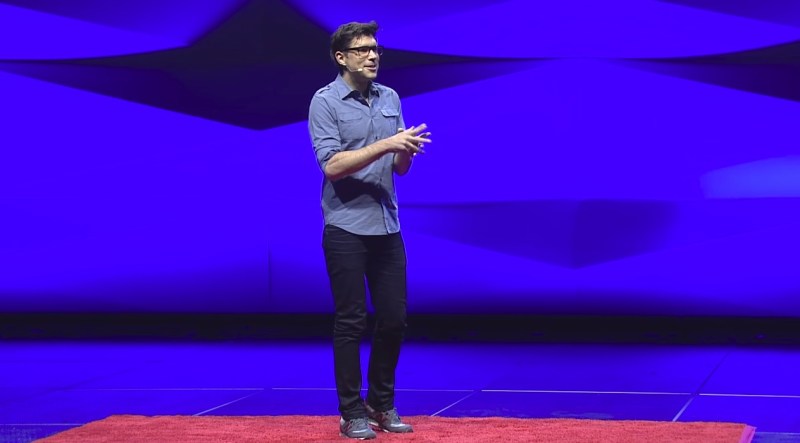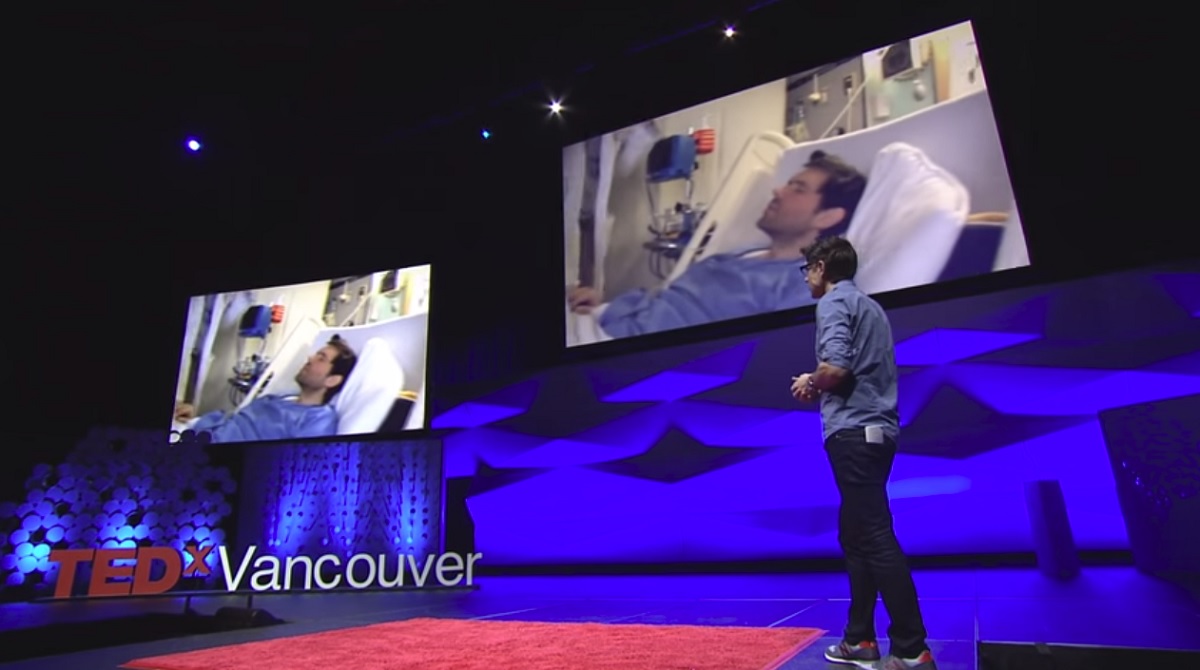Veteran TV host and game journalist Scott Jones has had a lot of challenges in his life. None more so than in 2014, when he had a series of strokes that incapacitated him. It was a brush with death, and after it, he decided to think about doing something more meaningful.
The result is the Heavily Pixelated podcast, which focuses on stories about gamers and their most vulnerable moments, whether it’s the result of divorce, illness, or heartbreak — and how video games helped them get through that time.
A Toronto native, Jones used to be a total mess himself. He was kicked out of grad school in the 1990s. He moved to New York for some salvation. He took a regrettable job at a porn magazine. He endured a botched operation, was in New York City on 9/11, and he began to drink too much. The one constant he had was video games. They saved him, and he remembered moments in his life when he was playing a video game at a critical time, and how games reassured him. They also helped him get through his illness.
In Heavily Pixelated, he talks to people about the positive effects that games have had on the lives of his interviewees. His first episodes started airing this month. He spoke with a man who used Destiny to get through a divorce, a man who played Fallout 3 while dealing with cancer, and a woman who played Mass Effect to understand what it would be like to be transgender.
I interviewed Jones, whom I consider a friend, about this shared passion for games and why he finds interviewing people about playing them so intriguing and therapeutic. (Jones’ favorite game is Resident Evil 4, and he played a lot of Bloodbourne while recovering from his illness).
I’ve always thought back to the moments in my life when I picked up a game and it immersed me in a world where I could forget about something in real life or the moments in games that remind me of something I should remember. I was impressed that Jones came to the same insight: that talking about games is therapeutic and playing them is as well.
Here’s an edited transcript of our interview. Heavily Pixelated is available on iTunes,Google Play, TuneIn, Soundcloud, Spotify, and Sticher.

Above: Scott Jones is a longtime game journalist and player.
GamesBeat: You have the first season out now?
Scott Jones: Not the whole first season. I was originally going to release all of the episodes at once. Some podcasts do that. But I had a couple of episodes that hadn’t quite come together completely, and so I figured just doing a weekly release schedule — also, it’s summer. It’s a slow news time for video game stuff. There’s no huge triple-A releases until maybe Madden. July and August are mostly quiet months.
I was hoping that there would be more bandwidth for people to give this a shot. It’s unconventional. It’s not like the typical video game podcast with a million jokes and everybody reading press releases and talking about whether the Xbox One will beat the PS4. I don’t always have the highest opinion about video game podcasts. I just feel like we can do them better. I thought maybe I could do them better, so I’m trying to do them better. I’m trying to talk about different things, not just the daily news cycle.
GamesBeat: It sounds like these things got a lot more important to you after your illness.
Jones: Yeah, that’s part of it. I went through what I went through in 2014, and I came out the other side, thankfully. The whole time I was sick and in the hospital, I was just grateful for the career I’ve had. As a writer and as someone who’s been doing TV and working in the video game industry for more than 15 years, coming up on 20 years now, I’ve had so many surreal moments.
The video game industry, the video game medium, has been very good for me, and very good to me, for a long time. I remember laying in the hospital after my stroke and thinking, “I can’t tell if half of the things I think I did are things I actually did.” There’s been so many surreal moments. Meeting people who are heroes to me. We’ve all interviewed Miyamoto at some point now, but 10 years ago, when I first talked to him, I couldn’t believe I was talking to this guy. There was this incredible gratitude that grew inside me while I was in the hospital, powerless. I couldn’t wait to say thank you to the industry and the medium of video games.

Above: Scott Jones at TedX, viewing an image of his 2014 hospital stay.
Every hard time I’ve had in my life—if I get fired or a girl breaks up with me or whatever is going on, whatever I’m trying to endure, the first thing I think is, “What game am I going to play to get over this?” I’ll go to the store, and if there’s a new console I don’t have, maybe it’s time to get that one. A lot of my video game purchases are centered around times of heartbreak, or in some cases self-pity. I realized that there have been numerous occasions in my life, when I was in pain or I was lonely or I didn’t know what to do, and I turned to games over and over again for comfort.
GamesBeat: It seems like an interesting insight, that everybody shares this. Everybody has some kind of memory of a game that triggers a memory of what was happening in their life.
Jones: That’s right. My understanding of the show is it’s 50 percent therapy session. I like therapy. I like getting to know your inner landscape. I like getting to know the texture of your soul or whatever poetic language you want to use to describe that. It’s important to me. And the other 50 percent is celebrating a great game that got a person through whatever their tough time was in their lives.
Because I’ve worked in the industry for so long, I like to punctuate the episodes, when I can, with a moment of gratitude. For example, I just had a guy on who had leukemia twice in the span of a couple of years. Fallout 3 got him through some tough times. I put him on the phone with Todd Howard, just to say thanks. That’s something we don’t do enough as gamers.
The median age for gamers now is climbing into the high 30s. It’s getting closer and closer to 40. We’re all aging. We’re all becoming more articulate. There’s lots of thank-yous I don’t think we’ve ever formally delivered in this industry. No one ever says thank you to these guys. The thank you is always, “Well, I bought your game.” Or in your case or mine, “I reviewed your game.” But just telling these guys, saying the word, “Thank you for making this.” I think that’s therapeutic for both the person saying it and the person who made the game.
GamesBeat: I do remember a lot of interviews — I think it was Todd himself, maybe, where he said that it’s gratifying to hear these things back from people who talk about how they had these moments and games helped them get through it.
Jones: I just think there’s a therapeutic benefit to playing games. My head bursts into flames every time I see a news story about how – -this school shooting happens in Florida and somehow it’s DOOM’s fault. Come on. It’s the most wrongheaded, most frustrating thing, for me, that I’ve heard in my life. We’ve had plenty of terrible things. But that news story, that news beat, in the media it’s been a staple. They go back to it every few months. I’m sick of people feeling like they have the leverage to lodge this argument against a medium that’s gotten me through some really crummy times, every time something bad happens in the world.
I thought, well, I could sit here and let my head smolder, or I could try to say something. I could try to articulate what games have done for me and for other people. That’s really the goal of the show, to articulate something that I don’t think — it’s not like I’m the first one to ever do this. I’m just trying to formalize it. I’m trying to say, “Listen, you think this about video games, but have you listened to this? This is also true.”
I think as gamers get older we get more articulate, more comfortable and confident in talking about our emotional and spiritual landscape. The gamers I know — the reason I’ve been in the business as long as I have is I feel like this is my tribe. These are my people. I fit in to this tribe. I speak the language that everyone else speaks. I just can’t believe that this medium that has done so much for me is wronged on a routine basis at this point in time.
GamesBeat: The name Heavily Pixelated, is that a play on words? You could interpret it in a lot of ways.
Jones: I had the idea for the podcast a couple of years ago. I went to a kind of GDC of podcasting here in Toronto at a film festival called Hot Docs. They had a couple of information sessions. Back then I was still in the gray area between media and business. I got a press pass and sat in on all these panels, and one day it just popped into my head. “This is exactly what I want to do.”
I don’t know where the title came from. For me, when something is pixelated, heavily pixelated, on a news program, it’s usually to obscure genitals or something horrible. But with video games, pixels bring clarity. I mean that in a literal sense, but in an abstract sense as well. It’s about that pursuit of clarity. People have clouded versions of stories that happen to them. These stories started out pixelated in the sense of being obscured. But in this particular moment, in the show, what I’m trying to do is bring some clarity there.

